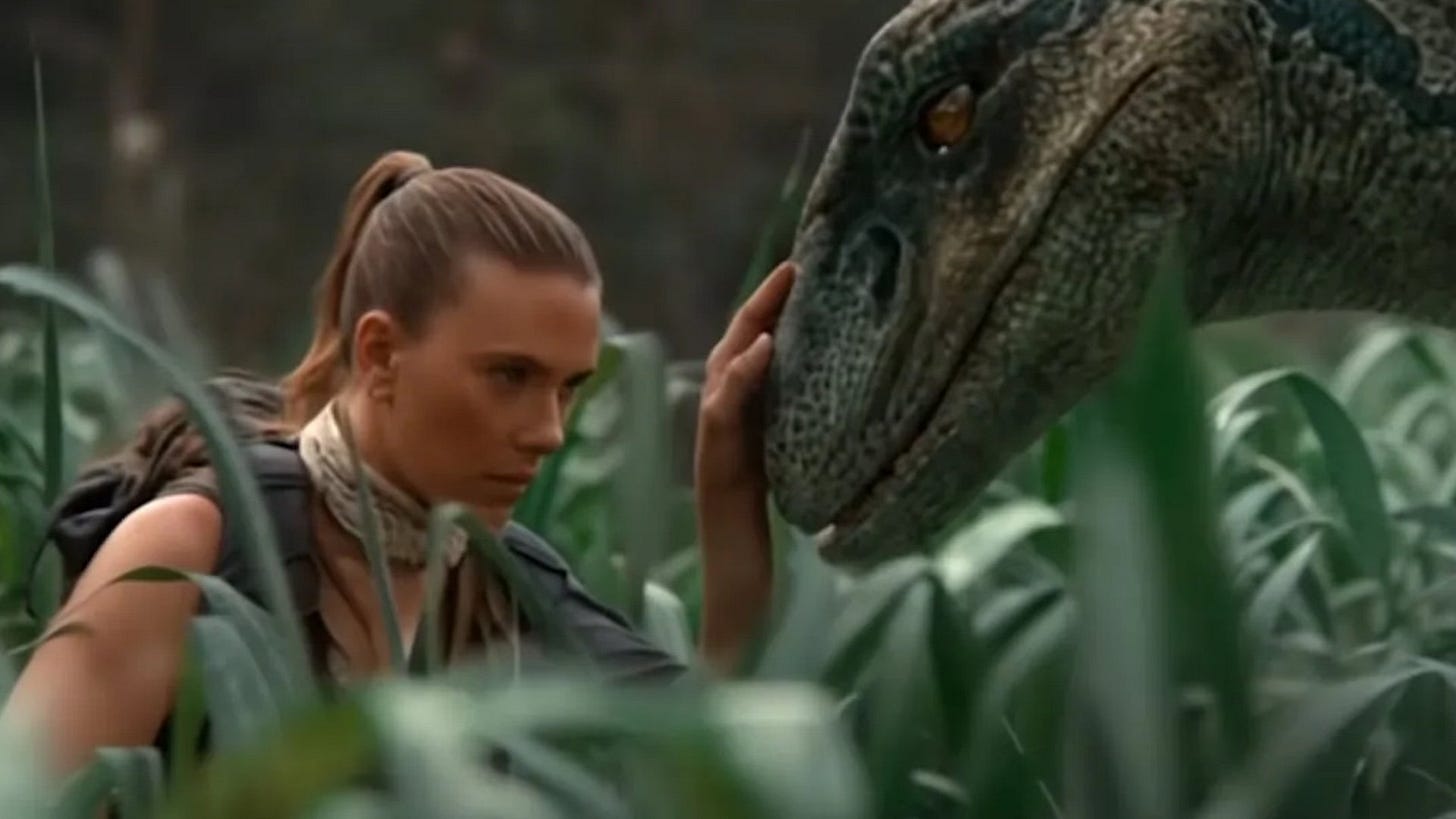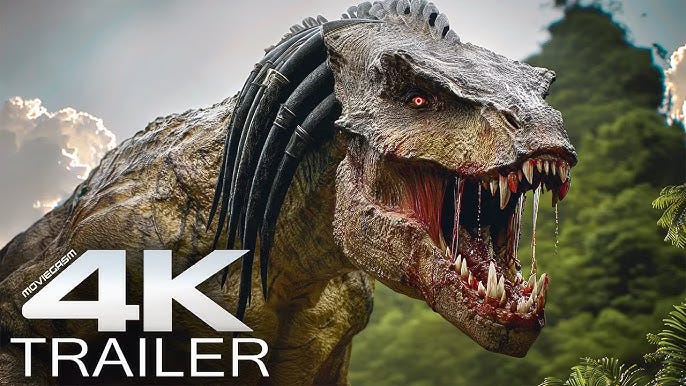A few days ago, I wrote a Substack post in which I conjectured the merits of Jurassic Park and the dearth of comparable dinosaur films released in its wake. This was written in anticipation of Jurassic World Rebirth, the fourth installment in a series which has been terrible, but has made a lot of money. I had stupidly assumed with the third installment, Dominion, which resurfaced Park’s originating trio (Dern/Neill/Goldblum), the films would be rightfully retired, concluding as a trilogy like its parent franchise. But every film in the Jurassic World universe has made over a billion dollars at the global box office, so I guess there you go. Leonardo DiCaprio in Killers of the Flower Moon voice, “I do love that money, sir.”
Yet I found myself in tentative anticipation of Rebirth. Helmed by Gareth Edwards, penned by Jurassic Park’s original co-writer David Koepp (whose record is admittedly spotty, but recently co-wrote two cracking Soderbergh scripts, Black Bag and Presence), starring some actors that aren’t Chris Pratt or Bryce Dallas Howard, I thought that maybe a Jurassic World film finally had a shot at being kind of good. More than anything, I was hopeful of Edwards in the director’s chair. His Godzilla receives some deserved flack for its character storylines, but he displays a tremendous articulation of scale when it comes to the kaiju. As evidenced by Godzilla 2014, it is difficult to match that precious combination of slop action and human heart that Spielberg excelled at. But surely we have the technology, let alone the expertise, to make an entertaining monster film?
Jurassic World Rebirth is here to confirm for you that, no, actually, we don’t. It’s exhausting to even want to write about, because it’s just so “dead dove do not eat.” What did I expect, really? If Jurassic World was simperingly about how humans couldn’t possibly learn from their mistakes when commerce is on the line, Jurassic World Rebirth is about how the continued perversion of nature is justifiable as long as it provides a net good to humans, i.e. wholesome entertainment, i.e. another billion dollars.
32 years since Jurassic Park first opened its doors, the public has lost interest in dinosaurs. Let’s not think too hard about how that doesn’t really make sense. The failure of Jurassic World may have let loose prehistoric creatures onto the planet, but their ability to adapt to a world with 65 million years of separation from their own has proven deadly. While some remain in captivity in places like New York City, only a small faction now run wild in remote areas hugging the equator, sequestered locales which boast toasty climates comparable to that of the Mesozoic era. The film purports that through their own resurrection, the unknowable mystique of dinosaurs has been dissolved. Now, they’re just big lizards that occasionally break containment in Cobble Hill, Brooklyn(?) and hold up traffic. Paleontologists who wear glasses like Dr. Henry Loomis (Johnathan Bailey) are thus out of a job, natural history museums becoming relics themselves.
But thankfully shady pharmaceutical executives with questionable motives are still around to give these paleontologists one last chance to flex their skill set before they’re put out to pasture. In a premise echoing that of The Lost World, Martin Krebs (Rupert Friend), a representative of the company ParkerGenix, looks to enlist a ragtag team of experts and covert operatives to conduct a mission in the forbidden dinosaur jungles. As Krebs explains to mercenary Zora Bennett (Scarlett Johansson), dinosaur DNA from the largest remaining species—Mosasaurus, Titanosaurus, and Quetzalcoatlus—possesses properties that can be exploited for medicinal purposes and help to cure human disease. With a hefty reward promised for all involved, Krebs enlists Bennett’s help alongside Loomis, in addition to Bennett’s friend and team leader, Duncan Kincaid (Mahershala Ali), to track down these species and extract genetic material.
En route to the island, the team is sidetracked by a sea-faring family shipwrecked by the very Mosasaurus they seek. They rescue the terrified clan—father Reuben (Manuel Garcia-Rulfo), daughters Teresa (Luna Blaise) and Isabella (Audrina Miranda), and Teresa’s boyfriend Xavier (David Iacono)—but should probably have left them for someone else to retrieve. The family becomes strung along with the team’s life-threatening operation, leading to a confrontation with both the Mosasaurus and its Spinosaur buddies that ends with the blood sample being successfully extracted but the ship running aground. Separated from the defenseless family, the two groups are forced to traverse the unknown, dinosaur-infested wilds in their respective search for rescue.
Following the otherwise flop-a-minute spectacular of the three previous World films, Rebirth attempts a return to form. David Koepp is back as the screenwriter, yet this script might be worse than any of the previous World films. Dinosaurs are front and center again after the bafflingly bug-focused Dominion, but they look like shit. The film goes so far as to mirror full sequences from Jurassic Park and can’t manage anything of its own creation. This is ironically evinced in the “mutant dinosaurs,” of which there are noticeably only two. Rebirth touts this return to form when there is no foundation of form to return to, aside from a craven desire to once again hook audiences with low-effort, genetically-modified dinosaurs as in the meta-commentary case of Jurassic World 1. The film is like the cinematic reinterpretation of that oft-memed Nathan For You moment, in which Fielder theatrically presents a man with a banquet platter only to reveal it has no food within.
There is a truly insulting lack of imagination, artistry, and even entertainment value in Rebirth, for a series already coasting mostly on name recognition. That Spielberg (through his Amblin production company) has any producing involvement in these films is hilarious. What if Oppenheimer kept enthusiastically giving the U.S. government millions of dollars of his own money to make more, worse atomic bombs?
Maybe I’m so unreasonably aggravated by the quality of this stupid film because in the DECADE since the Jurassic World series was kindled there has been no discernible improvement, no lessons learned, no reignited commitment to upped quality. It makes sense: there is no tangible reason to do so. Despite the superior quality of the originals, the billion dollar guarantee inherent to the new franchise means that the films can happily skirt bare minimum competency. Why make any attempt at imagination or artistry, when that would require actual effort, skill, and care?
Instead, it’s basically fine if a handful of talented, even Oscar-winning actors give career-worst performances in front of green screens. This is overdone to posit, but it really does sound as if some general dialogue goals and character outlines were fed through ChatGPT and what was spat out was an approximation of adventure film characters and what they might say. Terrible jokes and quips, forced emotional stakes, archetypal traits. Unlike Ducan Kincaid, Alan Grant didn’t need to ruminate on the off-screen death of his child in order for the audience to understand a concern for children’s lives—in fact, it’s Grant’s ambivalence towards children that makes their ultimate bond rewarding. Every character is annoying and unlikable, especially Johnathan Bailey as “bespectacled scientist.” I can see that there’s a hot, stupid man underneath those glasses! You can’t fool me!
But the most egregious sin of Jurassic World Rebirth is that its dinosaurs just flat out suck. In the 32 years that separate Rebirth from Park, technology has been unable to surpass the enduring charm and majesty of jerky puppets and covertly shadowed CGI, the former of which Rebirth does not even lightly dabble in as opposed to its immediate predecessors. The dinosaurs of Jurassic World might superficially look better than those of Jurassic Park—especially compared to the full daylight scene in which Grant and Hammond’s grandkids watch T. rex chomp on some stampeding Gallimimus—but it’s part of what makes them look so much worse. The elegant, streamlined movements of our modern-day movie dinos betray the physical disposition of cartoons. They move too effortlessly, they appear to us too readily, and they look so much less real.
Unlike the successive Godzilla/Kong team-up films where the monsters are just traipsing cartoons, Gareth Edwards was preoccupied with the realistic impression of Godzilla’s physicality. How destructive his movements would be, how labored these motions would be in synergy with his massive body, and how subsequently devastating his presence would be for the humans who encountered him. But Edwards’ previous grasp of evoking the awkward, unwieldy scale of a mammoth beast in Godzilla is utterly lost in Rebirth. Aside from this, there’s no tension in the presence of bloodthirsty dinosaurs, no satisfying set-ups and pay-offs, no real meaningful stakes. Even the pervasive threat of mutants receives little consideration aside from an opening scene meant to evoke the raptor mishap which opens Jurassic Park. When the big bad enters, a freak called “Distortus rex,” there has been no impactful build-up to instill gravitas to its reveal. It’s just a goofy-looking parody, not even a dinosaur but a farcical kaiju. That “wonder and awe” of Jurassic Park that Johnathan Bailey claims is conjured by Rebirth is hollowed by a very obvious desperation to conjure it. Just because we stand around in a big fake field amidst Titanosaurs while the original theme plays and Scarlett Johansson soyfaces, doesn’t mean there’s an authentic spirit to what’s being presented—especially when the scene is such an obvious recreation of a better one.
Spoilers, because I don’t really give a fuck, but the movie ends like this: Scarlett Johansson and Johnathan Bailey do some talking, and they decide that the bio-samples they collected shouldn’t be relegated to producing medical cures which only benefit the 1%. They decide to forgo the fee promised to them by Krebs (who gets eaten by Distortus rex, bon appetit) and commit to getting the samples into the right hands. The paradox of this endeavor is that it’s really no more ethical than the InGen scientists who were Frankensteining with dinosaur genetics. Using dinosaur blood to cure heart disease is just as depraved as reanimating prehistoric animals for a theme park, yet even with the evil corporate stooge out of the picture this aim is portrayed as the heroic inverse of creating Distortus rex. Implicitly, the inception of Jurassic Park itself, and by extension Jurassic World, should be viewed as a positive for humanity. In the producer’s seat, maybe Spielberg wants us to think differently about what Jurassic Park did to Hollywood, too.
It’s conservative subtext for a film series which started out with a more environmentally-forward message: That humanity’s besmirching of the natural world will ultimately be its karmic end. In Jurassic World Rebirth’s view, however, the corruption of the earth via capitalism can actually save us, so long as we have pure hearts and good intentions. For a franchise that’s become a parody of itself, it’s fitting that the message of its latest installment would be a tone deaf exaltation of the very forces that allow for its continued and bankable existence. It’s clear from the earnest tone, abrupt conclusion, and overall shallow text that the film is not remotely aware of its own ironic implications, positioned solely as feel-good action/adventure fare to carry on the zombified lineage of Jurassic Park. Dinosaurs have been violently brought back from extinction for profit then allowed to slowly die, yet it’s noble to continue to exploit them for the benefit of humanity. The unintentionally cynical perspective of Jurassic World Rebirth aptly reflects the bleak reality that we live in: The people making the world worse want to convince us that they’re the ones who can make it better.
Still, if everything is going to hell, I wish I could at least get a good dinosaur movie out of it.






